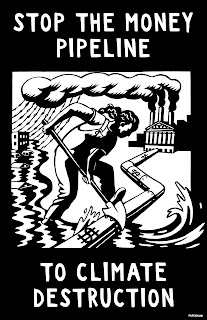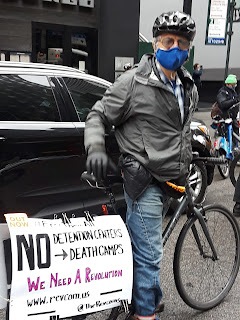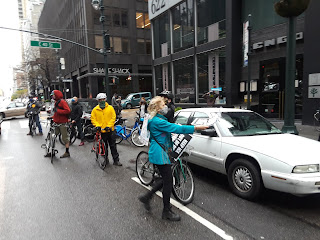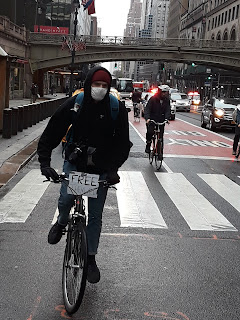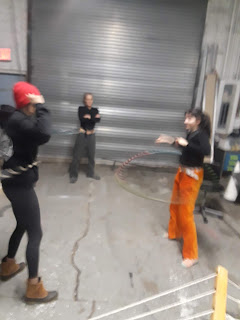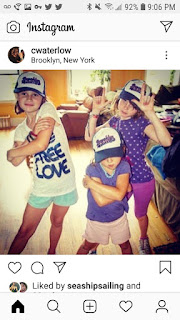One of the root causes of the climate crisis? Wall Street’s financing of fossil fuels. Big banks
such as JP Morgan Chase, insurance companies such as Liberty Mutual, asset managers andinstitutional investors such as BlackRock are pumping *trillions* of dollars into fossil fuels and
deforestation. That money is what keeps the fossil fuel industry alive - if we stop the flow of
money - we can stop the flow of oil.
Fly Orr, April 22
This guy... this sign... i can't...
My homies
Too many still in jail, free them all now. Abolish ICE. No human is illegal. Thanks for the pic Barbara Ross. #FreeThemAll
-Abolish ICE
-Shut Down ICE, Free Them All
-Cuomo, Release ICE Detainees Now!
-Cuomo, Undocumented Workers Need Emergency Relief!
-No One is Free Until Everyone Is Free
-Shut Down ICE, Free Them All
-Cuomo, Release ICE Detainees Now!
-Cuomo, Undocumented Workers Need Emergency Relief!
-No One is Free Until Everyone Is Free
A quiet chuckle with bad tv moment, a month into quarantine. Not always easy during the pause, but lucky to have these guys.
Shadow dancing in Sunset Park.
Oh New York, I love you. — in New York, New York.
The other night, I found myself watching The End of the Affair,
Ralph Fiennes and Julianne Moore running around London during the blitz,
hooking up in between air raids, hoping to elude fate, until finally, it all
hits home.
Julianne prays he’ll live, promising to live a different life if he
survives.
"Love doesn’t end just because we don’t each
other..." she says as she leaves him in Graham Greene’s story.
Its somehow a sentiment many of us feel, separated from friends and family
in quarantine.
Love doesn’t just end because we don’t see each other.
I wonder what kinds of affairs are ending here.
People separated from friends, partners, schools.
Our street life changed, restaurants, cultural spaces shuttered.
No one is sure what is going to reopen or who’s going to reconnect.
Riding through the city its exhilarating and a little scary to see so
many boarded windows.
The world can just stop.
But what happens after that?
What comes back?
What starts?
As the death continues,
a friend's father,
a friend from an art gallery,
another from high
school,
an aids advocate who lived with the virus for
32 year.
before Covid took him
out.
Mark
Milano notified me about Ed Shaw, writing.
To those who think COVID-19 is just
another flu: my fellow long-term survivor Ed Shaw just succumbed to it. After
beating AIDS for 32 years, this damn virus took him. Rest in Power, Ed.Jennifer
Flynn Walker posted
Jaszi-Johnthan Alejandro
I pray for all those that are dealing w| loss, illness & the fear unknown (during these scary times) — find some comfort and peace to their pain this week #RIP
#FreeThemAll Car+Bike Demo: Say No To Death Camps
“Cars+folks on foot will meet at Cuomo’s NYC office (633 3rd Ave, New York, NY 10017). Bikes will meet at Union Square, leaving from there at 3pm sharp... Otherwise please join at Cuomo’s office as well! Governor Cuomo has the emergency powers to order the release of all ICE detainees locked up in NY State. Join us by car or bike to demand Governor Cuomo #FreeThemAll in the interest of human life, dignity, and public health.”
Riding to the action, empty stores are everywhere.
A few cars zoom about as if NYPAUSE is an opportunity to speed.
After this is over, hopefully we’ll see less cars.
Its not that the streets belong to them.
It is space,
“that motor vehicles have commandeered,” says a writer for the Atlantic.
Streets are for sharing.
Looking at the sidewalks, I miss those cafes and pubs and restaurants, the bustling metropolis where we meet. But it’s gone. In its place is something different, something quieter, more sustainable. But the challenges remain.
“Do you think its going to look like the 1970’s after this is done,” asks my friend Babs as we ride back.
I follow the sounds of horns honking around the governor’s office, cyclists, outside, separated, in masks, cars driving around, blaring their horns, reminding the world people are still locked up, separated in prisons in our failed state that seems unable to take care of its people, unable to distribute health and safety good, masks, ventilators.
We go for bike rides all weekend, skateboarding, hoola hooping, banging pots and pans on the stoop with neighbors, watching a tired doctor we know get home from a long shift. Hopefully we learn to take care of healthcare workers.
Jaszi-Johnthan Alejandro
I pray for all those that are dealing w| loss, illness & the fear unknown (during these scary times) — find some comfort and peace to their pain this week #RIP
#FreeThemAll Car+Bike Demo: Say No To Death Camps
“Cars+folks on foot will meet at Cuomo’s NYC office (633 3rd Ave, New York, NY 10017). Bikes will meet at Union Square, leaving from there at 3pm sharp... Otherwise please join at Cuomo’s office as well! Governor Cuomo has the emergency powers to order the release of all ICE detainees locked up in NY State. Join us by car or bike to demand Governor Cuomo #FreeThemAll in the interest of human life, dignity, and public health.”
Riding to the action, empty stores are everywhere.
A few cars zoom about as if NYPAUSE is an opportunity to speed.
After this is over, hopefully we’ll see less cars.
Its not that the streets belong to them.
It is space,
“that motor vehicles have commandeered,” says a writer for the Atlantic.
Streets are for sharing.
Looking at the sidewalks, I miss those cafes and pubs and restaurants, the bustling metropolis where we meet. But it’s gone. In its place is something different, something quieter, more sustainable. But the challenges remain.
“Do you think its going to look like the 1970’s after this is done,” asks my friend Babs as we ride back.
I follow the sounds of horns honking around the governor’s office, cyclists, outside, separated, in masks, cars driving around, blaring their horns, reminding the world people are still locked up, separated in prisons in our failed state that seems unable to take care of its people, unable to distribute health and safety good, masks, ventilators.
We go for bike rides all weekend, skateboarding, hoola hooping, banging pots and pans on the stoop with neighbors, watching a tired doctor we know get home from a long shift. Hopefully we learn to take care of healthcare workers.
Oh no. The
first organizer for VOCAL-NY. He introduced me to Joe Bostic and Cliff Mosley.
He used to mobilize 1000 people for events. Frankly, I'm not sure anyone else
could do it better. Rest In Power, Ed
Shaw.
I
replied,
RIP Ed Shaw One
of the greats. A kind man, another HIV warrior…
Used to see him almost weekly at meetings and
he always greeting me with a smile, the consummate gentleman, caring,
welcoming, staying clear or drama or battles, inviting everyone into the
process of organizing and advocating.
As the
Sunsets on another Spring day... I’ve come to find out that the sun has also
set on the life of Mr. Ed
Shaw— a mentor from my past, a longtime health advocate for the
community & a dear friend to many... IDK Ed’s Family but my prayers are
with you ❤️
Sean Strub
follows,
A few weeks ago, my friend Ed
Shaw sent me a meme via FB messenger that said "Tell someone today how
much you love them. There's no promise we'll have a tomorrow." We didn't
see each other much in recent years, but FB kept us connected, usually with
holiday greetings, silly memes or occasionally a shared reminiscence. Ed died
last week, from Covid. He was a caring and upbeat activist, one of the very first
to bring attention to the unique issues involved with HIV and aging. Ed and I
became friends and allies in the mid-90s, when he went to work for POZ,
officially helping organize our POZ Life Expos but also serving as a liaison to
the most disenfranchised communities in New York's mosaic of people living with
HIV. He raised the consciousness of those around him, including mine. He was a
quiet leader who leaves a powerful legacy of love. RIP
Something I
find myself unable.
We have
our moments with the virus,
Peaks and
valleys.
A glimpse
in facebook.
Dragonfly
having a Prince dance drunk karaoke moment.
At first silly,
then life affirming.
Its what everyone
was thinking.
You think I’m
rude, but I’d rather be nude.
Darling
Nikki
Thank you
for the funky time, call me up whenever you want to grind.
Everyone
recalling those funky times,
Those high
and lonesome moments.
We’ve been
listening to Prince every night.
I don’t
know why.
Starfish
and Coffee
I could
never take the place of your man.
On and on
and on.
Nothing compares
to you.
Lots and lots of dancing and hoola
hooping.
Spike Lee prince michael jax
dancing party helped.
One of my
favorite New York writers Tim Murphy was organizing a fundraiser to get food
supplies to homeless kids in a shelter for people with COVID.
Murphy is the author of the novels
"Correspondents" and "Christodora," both published by Grove
Atlantic. Since the pandemic began, he’s been working to get kids in shelters
food and supplies, as well as medical workers protective equipment. To help out, he asks that people reach out to
@CutRedTape4Hero,
a group that puts personal protective equipment directly into the hands of NYC coronavirus
workers.
I
interviewed him for the Howard Zinn podcast.
In this interview, which will be
posted later this week, he speaks about writing, HIV, and the ways this pandemic
is impacting us.
A few
highlights:
Can you
tell us what it is like right now, I ask.
Lots and
lots of phone calls to friends, he says.
As someone
who has lived through the AIDS crisis, can you reflect on this plague moment.
“I am
always careful to note that I moved here in 1991 and wasn't in ACT UP, and I
don't feel like I lived through the worst part of the AIDS crisis because I
have literally lost no one close to me from AIDS - we were too young out of
college in 1991 to barely know anyone who even had HIV/AIDS - I feel like I
came up in the 2nd generation that wasn't devastated but where we had a lot of
fear paranoia and trauma around sex because of AIDS, which did not really abate
until at least 1996 and then of course even more so starting in 2012 with PrEP”
Murphy and
I talk about the ways those feelings permeated into our most intimate worlds.
And the feeling
of déjà vu today.
I ask
about how he writes about this experience.
Beginning
with editing a GMHC volunteer magazine, Murphy started working as an AIDS
journalist, and became more and more engaged in the writing and the world.
I met him in
2004 when I was working at CitiWide harm reduction, involved in regular acts of
civil disobedience to defend AIDS services.
After
Keith Cylar died, he wrote about us going to DC to get arrested,
We talk about that day and the attacks on AIDS services,
on AIDS
Drug Assistance Program that was taking place.
Then as
now, we know health care is a human right.
Public
health supports everyone.
We are all
better off when one person does not get sick.
The breadth
of his writing expanded and expanded.
The
epigraph at the beginning of his novel Christadora is from
“His greatest love was NY,” says Murphy.
“I think he was dying on a train.”
I thought he was referring to the
shades inside a building, perhaps overlooking Tompkins Square Park, where the characters
of his story and life stroll.
One of my favorite short stories by
Murphy is
In it, he writes about flirting
with a feeling, a beauty in a moment
beyond time, as intoxication grips. He
meets two friends who show him a feeling he never had before. Their cheerful
comradery is irresistible, taking into a places from which it was hard to return.
Love consumes us,
but the double edge of the ride with the Dionysus cult can be days without
sleep, the mind losing itself to darkness, violence and Thanatos. Then and now, how do we love and contend with risks without losing
ourselves?
Murphy and
I talk about writing and getting high, desire and expression.
“The feeling that
you’ve gone off the rail,” says Murphy. “It’s
the reaction to trauma.”
We took part in
the inauguration protests in 2017. Walking around that day, it almost felt like
he had Stockholm syndrome as he
interviewed people.
Those actions,
trying to disrupt the inauguration were a reaction to the horror of Trump.
Looking at our
country, Murphy identified a racism that he explores in his 2019 novel Correspondents.
The challenge is to
engage people through stories says Murphy.
The stories about
racism about HIV.
Its always about
stories.
In the end of the
affair, Graham Greene writes: "Love doesn’t end just because we don’t see each
other..." Tell me about this sentiment in the era of the coronavirus.
“We can stay
connected even if we are not IRT (in real time). That’s sort of how…”
says Murphy.
Lookout for the
podcast this week.
After I complete
the interview,
Charles King posts
a note on twitter about the shelter Murphy was raising money for.
“I have a heavy
heart this morning. One of the residents
of our isolation shelter left the facility and later committed suicide. The virus takes its toll in many ways, especially
on people who are homeless.”
A few days later
a doctor follows suit.
Sometimes we all
feel useless.
Everyone seems to
be going through it.
And for those
still in jail or detention, its far worse.
Many of my
students are part of such families.
After a full day of
meetings about how our university was going to respond to Covid, a group of us
met on Friday after noon for a bike action at the Governor’s office.
Like a lot of
people in this time, I've had lots and lots of vivid dreams, with pieces of my
life blurring by as I sleep, watch old movies, Taxi Driver last night, the Zoom
trailer everyone is watching, Who Are You? Rob Lowe, who still looks great,
telling everyone he is sleeping more these days. Some dreams concern things
best kept quiet, meeting odd friends, making new ones. At some point last week,
I found myself featured on the cover of the Who's last album with Keith Moom,
1978's Who Are You. Not my favorite who album. Who Are You? I was there or was I?
Who are you? Who are we?
Mom and I talk on
Sunday over a
socially distance, talking life and death strolling through her garden, wondering
about why some come and some go, looking at the earth opening up, thinking
about our debts to nature.
“I look at the birds. Everybody
has to go,” she says. “We all have to die.
‘We owe god a death,’ your father used to say. I used to reject that. Now I don’t.
Its just a question of when I’ve
had enough.” We talk about incubation
and ventilators, War and Peace, human fragility and bravery.
“We’re brave when we must be,” says she. “One day at a time. Every day
that I am here, every day that I get over that hump.” Pointing to the peonies, the Cocapelli and Amadeus daffodils, she says: "Doesn't it just
make you happy." Glad she’s still here to show me her garden.
She says she misses everyone and appreciates their greetings from afar. It's
just hard on her fingers to write or call. Just because we're apart doesn’t
mean we don’t love each other.
All
week, the little one and I read, #TolstoryTogether, finishing part one, moving
into part two. People around the world are
reading or re reading War and Peace.
Its
my second go of it. First in college, the
second, out loud with the 13-year-old, taking in this study of the petty and
heroic elements of human nature under crisis.
A
writer for the Economist observes:
The
little one draws or paints or sleeps as I read away.
Often
we have no idea what is going on.
She
helps keep me on track.
This
is a story of a people coping with wars, trying to figure out who they are.
Occasionally
a bit of poetry:
'If I were Tsar I
would never go to war,' said
Nesvitski, turning away. ... searching for something, gazed into the distance,
at me waters of the Danube, at the sky,
and at me sun. How beautiful die
sky looked; how blue, how calm,
and how deep!
How bright and glorious
the setting sun.
With
what soft glitter the waters of the distant Danube shone. And fairer still were
the faraway blue mountains beyond the river, the nunnery, the mysterious
gorges, and the pine forests veiled in the mist of their summits... There was
peace and happiness... “I should wish for nothing else, nothing, if only I were
there,” thought Rostóv….
“In
myself alone and in that sunshine there is so much happiness; but here...
groans, suffering, fear, and this uncertainty and hurry... There—they are
shouting again, and again are all running back somewhere, and I shall run with
them, and it, death, is here above me and around... Another instant and I shall
never again see the sun, this water, that gorge!...”
At
that instant the sun began to hide behind the clouds, and other stretchers came
into view before Rostóv. And the fear of death and of the stretchers, and love
of the sun and of life, all merged into one feeling of sickening agitation.”
All
week, it “merged into” that “one feeling.”
catherine in book group.
Michael, the Cat and Me.
Movie Night
In honor of Beastie Boys doc,
a few tough kids.


